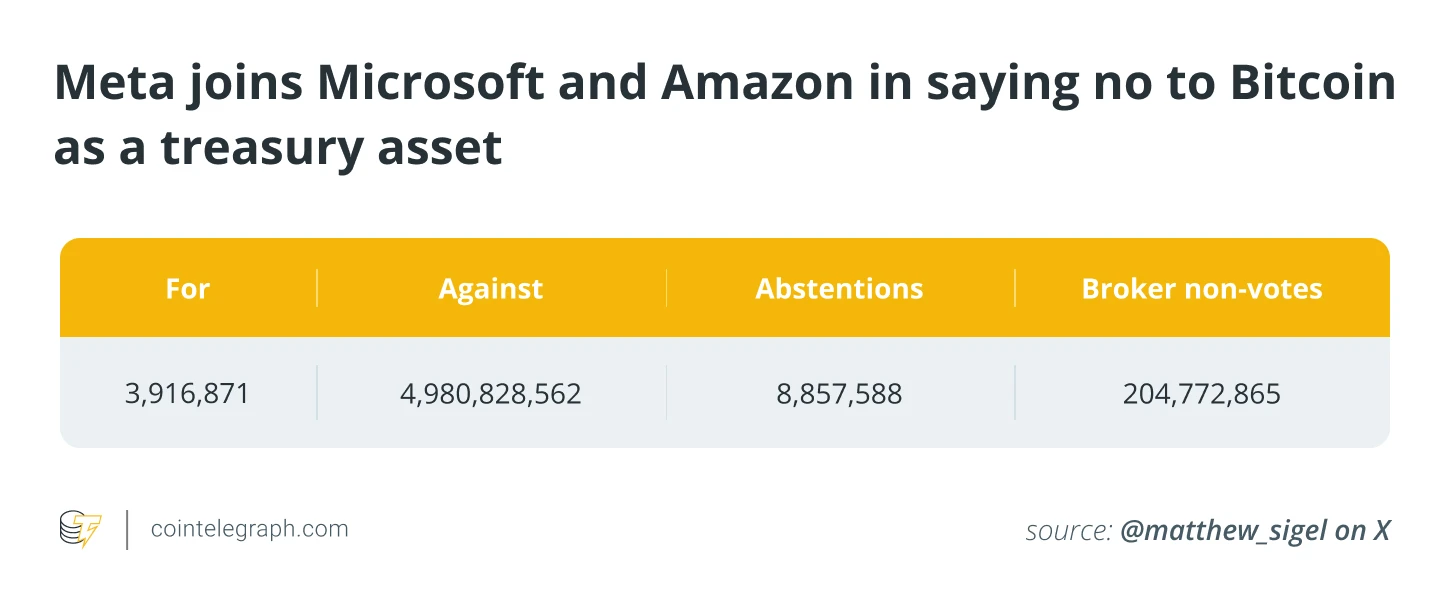Original title: Bitcoin as corporate treasury: Why Meta, Amazon and Microsoft all said no
Original author: Marcel Deer
Compiled by: Asher ( @Asher_0210 )

Editors note: Bitcoin, as an emerging digital asset, is gradually being viewed by some companies as an alternative means of financial reserve, attracting a lot of attention. However, its sharp price fluctuations, uncertain regulatory environment, and risks such as possible dilution of shareholder value have made most large companies cautious. Technology giants such as Meta, Amazon, and Microsoft have explicitly refused to set up Bitcoin reserves, giving priority to ensuring financial stability and business stability.
In contrast, Strategy has actively deployed Bitcoin, leveraging its rising potential to achieve significant stock price growth, but it has also taken on greater risks. Overall, companies generally balance innovation and risk, and Bitcoin financial strategies are still a minority of attempts in the short term, and future development still depends on further clarification of the regulatory and market environment.
The basic logic of enterprises in Bitcoin reserves
When a company holds Bitcoin on its balance sheet, it is called a Corporate Bitcoin Treasury. Different from holding only traditional financial assets and cash, some companies also use Bitcoin as an alternative store of value or investment strategy. Converting cash reserves into cryptocurrency is a new change in corporate financial strategy. In recent years, this concept has received a lot of media attention, especially Strategys continued expansion of Bitcoin reserves, which has sparked widespread discussion.
Currently, more and more companies are considering moving funds from traditional safe assets to this more volatile digital asset class, and the most optimistic forecasters believe that the price of Bitcoin could be between $130,000 and $1.5 million.
But on the other hand, establishing a corporate cryptocurrency strategy also means that the company needs to take considerable risks. Traditional financial management emphasizes capital preservation, while Bitcoin financial management introduces speculation and volatility into the balance sheet. Matthew Sigel, head of digital assets at VanEck, warned that companies like Metaplanet that actively raise funds to buy Bitcoin may go from strategic growth to shareholder damage. Once a companys stock price is only equal to its net asset value, issuing shares to buy Bitcoin is no longer a strategic act, but an erosion of value.
In other words, if a companys stock is no longer trading at a premium, then issuing additional shares to buy Bitcoin will dilute shareholder value rather than increase company assets, which is a red flag for investors. Therefore, how a company manages its capital reserves will directly affect its valuation and its ability to cope with economic downturns. For listed companies, introducing a Bitcoin financial strategy also requires the support of shareholders. Large technology companies such as Meta, Amazon and Microsoft have recently proposed similar ideas.
Meta, Amazon, and Microsoft’s stance on Bitcoin financial strategy
Shareholders of Microsoft, Amazon, and Meta have clearly rejected proposals to establish strategic Bitcoin reserves. At Metas 2025 annual general meeting, shareholders expressed strong opposition to the establishment of Bitcoin reserves, with more than 90% of shareholders voting against the proposal. The proposal suggested that Meta consider converting part of its $72 billion cash reserves into Bitcoin. Here are the results of this vote:
Votes in favor ( 3,916,871 votes): The number of shareholders who support Meta introducing Bitcoin reserves;
Dissenting votes ( 4,980,828,562 votes): shareholders who strongly oppose the proposal, accounting for an absolute majority;
Abstentions ( 8,857,588 votes): These shareholders chose not to express their views and their abstentions were not counted in the results;
Brokers did not vote ( 204,772,865 votes): Shares held by brokers but did not receive voting instructions. For certain proposals, brokers cannot vote without client authorization.

This shows that with nearly 5 billion votes against the proposal, Meta shareholders firmly refused to include Bitcoin in the companys balance sheet.
Despite this, Bitcoin supporters still emphasize its scarcity and long-term value storage advantages. At the 2025 Bitcoin Conference in Las Vegas, Matt Cole, CEO of Strive Asset Management, called on Mark Zuckerberg to support the proposal, joking: You have completed the first step and named your goat Bitcoin. I ask you to take the second step and develop a bold corporate Bitcoin financial strategy. But in the end, the proposal received less than 1% of the votes in favor. The board had previously recommended rejecting the proposal, saying: We do not evaluate whether crypto assets are superior to other assets, but given our existing corporate financial management processes, the board believes that this evaluation is unnecessary.
This statement puts Meta in line with Amazon and Microsoft, three tech giants that have previously rejected suggestions to shift their corporate reserves to Bitcoin. They have all chosen to stay away from the volatility risks in the cryptocurrency field and adhere to a financially sound strategic direction.
Why are tech giants rejecting Bitcoin?
Meta’s board of directors and shareholders listed several reasons for rejecting Bitcoin as a financial strategy, mainly including risk, regulatory uncertainty, and business focus considerations:
Volatility concerns: Bitcoin remains an asset with volatile prices. Including it in a companys balance sheet may lead to large fluctuations in the companys earnings and financial condition. For traditional investors, this uncertainty in financial planning is a major concern;
Regulatory uncertainty: Crypto assets lack a clear and unified regulatory framework. As legal and tax policies continue to change, additional compliance risks are introduced for listed companies;
Business focus: Shareholders of large technology companies prefer to maintain predictability and stability of their businesses. Against the backdrop of accelerated AI and digital transformation, both the technology industry and the crypto industry are evolving rapidly, and companies generally want to focus on their core businesses and avoid being distracted by speculative assets;
Fiduciary responsibility: Companies must strike a balance between innovation and responsibility to shareholders. From a legal perspective, companies have an obligation to manage assets in a responsible manner, and Bitcoin is viewed by many as a speculative asset, which conflicts with the fiduciary duties of companies. Out of cautious consideration of legal risks, boards of directors generally tend to take a wait-and-see attitude.
Strategy is an outlier in Bitcoin financial strategy
Since 2020, Strategy has purchased more than 500,000 Bitcoins, with a total investment of more than $33 billion (based on an average price of $66,279 per Bitcoin). The US company was originally known for its business intelligence services, and although this is still its core business, due to its expanding Bitcoin reserves, Strategy has often been regarded as a Bitcoin proxy target since 2020. Michael Saylor, chairman of the company, said, The focus has now shifted to a Bitcoin acquisition strategy, and this strategy has been effective: On December 23, 2024, Strategy was successfully included in the Nasdaq 100 Index, becoming an iconic company in the context of digital assets.

As of June 2025, Strategy holds more than 2% of the total supply of Bitcoin, which has attracted widespread media attention. As the price of Bitcoin continues to rise in late 2024 and early 2025, Strategys stock price and company valuation have also risen. By June 12, 2025, Strategy (MSTR) stock price had skyrocketed 3,180% in five years , from $11 to $387. The stock price performance was highly correlated with Bitcoins trend, giving shareholders similar income exposure to direct holdings. But this high correlation also means that investors need to face the high risks brought by the violent fluctuations in the crypto market. Strategys case shows the huge upside potential of transforming a company through a Bitcoin financial strategy - but this aggressive path is not a risk most companies are willing to take.
Prospects for corporate adoption of Bitcoin reserves
Tech giants such as Meta, Amazon, and Microsoft are still focusing on their core businesses. At least in the short term, they are still waiting for a clearer regulatory framework for crypto assets and a more predictable risk environment. Before then, these companies are unlikely to take radical financial actions.
Bitcoin financial strategy is still an exception rather than a mainstream one. Meta shareholders’ rejection of the proposal shows that the concept is still more hype than reality, and even innovative companies are unwilling to risk huge volatility and strategic diversification in the face of potential returns. US technology giants are generally cautious and have not followed Strategy’s practice of using Bitcoin as a reserve asset, but continue to adhere to traditional and safe financial management methods.
The core principles of corporate financial management - risk minimization, liquidity protection, and consistency with operational needs - are incompatible with highly volatile assets such as Bitcoin. The price of Bitcoin can fluctuate violently by more than 50% in a few months, far beyond the tolerance of most corporate finance departments. Therefore, companies like Meta, Amazon, and Microsoft still concentrate their financial reserves on cash equivalents, short-term securities, and diversified assets, consistent with their main business strategies. Even in innovative companies, crypto assets are seen more as a burden than an advantage. In 2024, the collapse of several companies related to the crypto industry, coupled with the continued review of the US SEC and global regulators, further strengthened the conservative stance of companies.
Until a clearer regulatory framework, accounting standards and custody solutions are established, Bitcoin as a corporate reserve asset will still be tried by very few companies. In the short term, supporters who expect Bitcoin to be included in corporate balance sheets on a large scale may still need to wait patiently. Because for most CFOs, their assessment criteria are the stability of assets, not the speculative nature of assets.










